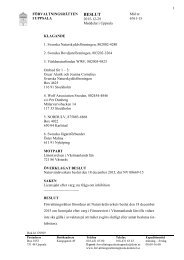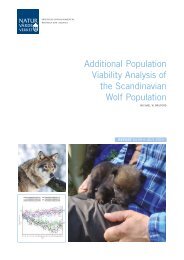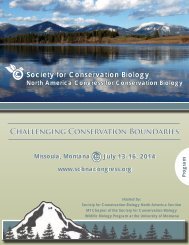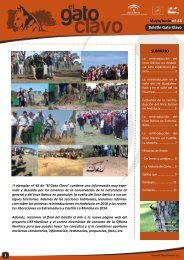1oC3Dbk
1oC3Dbk
1oC3Dbk
Create successful ePaper yourself
Turn your PDF publications into a flip-book with our unique Google optimized e-Paper software.
members who are at academic institutions also encourage<br />
their research students to undertake Galapagos projects.<br />
The entire endemic vascular plant flora of the Galapagos<br />
has been red-listed, as have the marine algae. Following five<br />
years of field work, the known lichen flora of the islands has<br />
more than doubled; IUCN Red List assessments of lichens are<br />
now under way, and plans are being made for a re-evaluation<br />
of the endemic vascular flora.<br />
Dr Alan Tye<br />
Chair, Galapagos Plant Specialist Group<br />
Isoetes fluitans – Endangered and endemic to a small area in Galicia in<br />
north-west Spain. © Klaus van de Weyer<br />
particularly those of inland wetlands. Nick Stewart has agreed<br />
to coordinate a link between the FPSG and specialists working<br />
on the conservation of charophytes. Under a project funded by<br />
Biofresh, an initial global list of wetland-dependent vascular<br />
plants, bryophytes and algae has been established. The<br />
process of conversion of this tool into a relational database is<br />
being developed with support from the Centre for Ecology and<br />
Hydrology in the UK.<br />
Richard Lansdown<br />
Chair, Freshwater Plant Specialist Group<br />
Galapagos Plant Specialist Group (GPSG)<br />
The GPSG is a discussion group for people interested in the<br />
conservation of the Galapagos flora whose members consist<br />
of the world’s experts in the field of Galapagos plant<br />
conservation, and is therefore in a good position to formulate<br />
explicit views on conservation policy. The group develops<br />
conservation priorities for Galapagos plants, including those<br />
for applied research, survey and management, and<br />
communicates these priorities in the form of advice to the<br />
relevant research and conservation institutions on the islands.<br />
Research is carried out by GPSG members employed in<br />
Galapagos and by others as visiting scientists. GPSG<br />
Justicia galapagana. © Alan Tye<br />
Galliformes Specialist Group (GSG)<br />
In early 2013, this Specialist Group became a full<br />
amalgamation of five previous ones, with the inclusion of the<br />
Cracids of South and Meso-America. This brings together<br />
global concerns about all the 286 galliformes species, and a<br />
worldwide community of about 280 people actively working on<br />
their conservation and sustainable use.<br />
The focus of the GSG must be the 25% of our c.280<br />
species that are currently listed as threatened on The IUCN<br />
Red List. Galliformes’ habitats, especially forests, are being<br />
disrupted and many species are also over-hunted. Whilst our<br />
tropical and subtropical species of Asia and the Americas<br />
remain under-researched, there is a wealth of knowledge and<br />
expertise available on the hunted grouse and introduced<br />
pheasant species of the Northern Hemisphere. So the GSG<br />
remains dedicated to making up this deficit through capacitybuilding,<br />
using its network to transfer knowledge and<br />
expertise: recently, for instance, from India to Nepal and<br />
Pakistan, and from China and Thailand to Myanmar.<br />
To spread the word about galliformes conservation more<br />
generally, the GSG produces a main newsletter G@llinformed<br />
as well as Grouse News and the Cracid Bulletin, all of which<br />
include project reports, technical pieces and alerts to recent<br />
literature. The GSG website contains an archive of all past<br />
issues. Papers from the most recent International Grouse<br />
Symposium (Japan 2012) have now been published in the<br />
journal Wildlife Biology.<br />
A major concern in 2013 has been to seek information and<br />
promote action on the plight of Edwards’s Pheasant (Lophura<br />
edwardsi), which is Critically Endangered and endemic to a<br />
small and heavily impacted area of central Vietnam. Matt<br />
Grainger (Newcastle University, UK) is moderating an email<br />
consortium for the GSG, designed to bring together key<br />
Edwards’s Pheasant (Lophura edwardsi). © Niti Sukumal<br />
56 IUCN species Annual Report 2013






